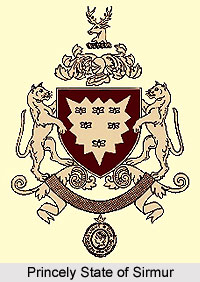 The Princely State of Sirmur, also known as Sirmaur or Sirmour, was one of the well known princely states of India that was administered by a native ruler under the indirect rule of the British Empire in India. It was founded in 1616 and was a part of the Greater Nepal and later became a princely state of British India. Currently, the district of Sirmaur is located in Himachal Pradesh district. The princely state was also known as Nahan, named after the Nahan city. The territory was governed by the chiefs of Rajput lineage, who held the title of Raja. Sirmur state was bordered by the hill states of Jubbal and Balsan in the north; by the British United Provinces of Oudh and Agra in the south; by the district of Ambala in the south-west; by the British district of Dehradun in the east; and the states of Keonthal and Patiala in the north-west. According to the 1901 census, the state comprised of a total population of 6256 in that year. The population of the state was 156,054 in 1941.
The Princely State of Sirmur, also known as Sirmaur or Sirmour, was one of the well known princely states of India that was administered by a native ruler under the indirect rule of the British Empire in India. It was founded in 1616 and was a part of the Greater Nepal and later became a princely state of British India. Currently, the district of Sirmaur is located in Himachal Pradesh district. The princely state was also known as Nahan, named after the Nahan city. The territory was governed by the chiefs of Rajput lineage, who held the title of Raja. Sirmur state was bordered by the hill states of Jubbal and Balsan in the north; by the British United Provinces of Oudh and Agra in the south; by the district of Ambala in the south-west; by the British district of Dehradun in the east; and the states of Keonthal and Patiala in the north-west. According to the 1901 census, the state comprised of a total population of 6256 in that year. The population of the state was 156,054 in 1941.
History of Princely State of Sirmur
Sirmur was originally known as Nahan that was founded by Raja Subans Prakash, also known as Soba Rawal. The state was renamed Sirmur by Raja Karam Prakash, who established the new capital in 1621. The Princely State of Sirmur was scattered over a total area of 1,046 sq m. it was incorporated as a part of the Punjab States Agency. The state was honoured with one of the Salute States of India with a gun salute of 11 guns. Sirmur state is divided into four tahsils fro administrative purposes and was under full civil and criminal jurisdiction. The native ruler of the state, who held the title of Maharaja, took charge of the administration. From January 1945, a legislative council was established comprising 22 members, who were elected on the basis of adult franchise.
After the Indian independence, the princely state of Sirmur was acceded to the Union of India, also known the Dominion of India, and was later merged with the modern Indian state of Himachal Pradesh.
Rulers of Princely State of Sirmur
Mahaharaja Karam Prakash (1616- 1630)
Mahaharaja Mandhata Prakash (1630- 1654)
Mahaharaja Sobhag Prakash (1654- 1664)
Mahaharaja Budh Prakash (1664- 1684)
Mahaharaja Mat Prakash (1684- 1704)
Mahaharaja Hari Prakash (1704- 1712)
Mahaharaja Bijay Prakash (1712- 1736)
Mahaharaja Pratap Prakash (1736- 1754)
Mahaharaja Kirat Prakash (1754- 1770)
Mahaharaja Jagat Prakash (1770- 1789)
Mahaharaja Dharam Prakash (1789- 1793)
Mahaharaja Karam Prakash II (1793- 1803)
Mahaharaja Ratan Prakash (1803- 1804)
Mahaharaja Karam Prakash II (1804- 1815)
Mahaharaja Fateh Prakash (1815- 1850)
Mahaharaja Raghbir Prakash (1850- 1856)
Mahaharaja Shamsher Prakash (1856- 1898)
Mahaharaja Surendra Bikram Prakash (1898- 1911)
Mahaharaja Amar Prakash (1911- 1933)
Mahaharaja Rajendra Prakash (1933- 1964)






































